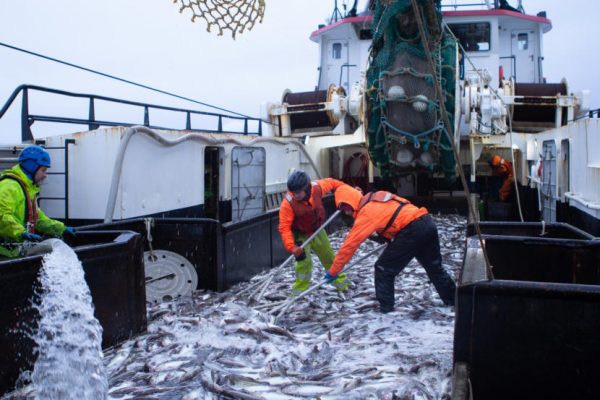
A new federal act will set aside funds each year to support fledgling fishermen, pending approval from President Donald Trump.
The Young Fishermen’s Development Act passed through both houses of Congress this month with strong support from all three Alaska legislators. If enacted, the act would fund training and mentorship opportunities for commercial fishermen who are just entering the industry.
It would be the first program of its kind for fishermen. The U.S. government already sponsors comparable professional development programs for young ranchers and farmers.
Grants and program funding would come from Congress. But it would be up to local communities to decide how to use the funding.
“So local nonprofits or Native organizations can apply and propose projects that make sense for that year,” said Marissa Wilson, executive director of the Alaska Marine Conservation Council. The council is one of the nonprofits that brought the idea for the act to Rep. Don Young’s desk five years ago.
“Things are changing so much year to year that having this sort of bottom-up program focus, I think, is going to be a lot more effective than having some kind of program legislated at the federal level and then trickling down across the nation,” Wilson said.
Wilson is a fisherman herself, based out of Homer. She started fishing with her dad when she was 14. But she said those who aren’t born into fishing families can have a hard time getting started in the field.
As a result, Alaska’s fishermen are trending older. In 2016, the average age for a commercial fisherman in Alaska was over 50 — a decade older than it was the previous generation. That’s known as the “graying of the fleet.”
Researchers from the University of Alaska studying the fishing industry in Bristol Bay and Kodiak found that young people were deterred by high economic and social barriers to entry, not lack of interest.
Fisheries demand a complex skill set, said Linda Behnken, executive director of the Alaska Longline Fishermen’s Association. They have to be able to run a boat and a business and keep up with technology.
And the industry has become more competitive over the years. This year, Cook Inlet fishermen in particular had to grapple with low returns on harvests and the prospect of closed fishing areas.
All together, it can be daunting for those without experience or family ties.
Over the last several years, young Alaska fishermen took trips to Washington, D.C. to talk to legislators about the act. They joined forces with peers across the country under the umbrella of the Fishing Communities Coalition, a national association of commercial fishing groups.
Abby Turner-Franke, of Soldotna, fished with her family from the time she was eight years old. She’s now a project coordinator for the North Pacific Fisheries Association in Homer.
She went to D.C. to lobby twice. She said it was exciting that young fishermen were involved in pushing the act through.
“For them to participate in that process, to meet with delegations and with staffers and to see this progress, from being written and going through different iterations, and also having to explain themselves and why it is beneficial — I think is an incredible learning opportunity in itself for young fishermen,” she said.
The act does not exactly specify what age is considered “young,” but does say the term encompasses those who are either starting out or have worked on a commercial fishing vessel for no more than 10 cumulative years.
Wilson said fishermen had originally proposed the act be funded by the Asset Forfeiture Fund, the fines collected from fishermen who violate regulations.
The bills that passed in the House and Senate, however, show money coming from the regular Congressional appropriations process each fiscal year.
“It’s great that we now have this mechanism that will be in place as soon as it’s signed by the president. But it’s going to be something that we’ll need to continue advocating funding for moving forward,” Wilson said.
Funding will be allocated through Sea Grants, a partnership of the federal government and universities across the country. Eligible tribal groups, organizations and institutions will be able to propose projects for funding.
The Young Fishermen’s Development Act is awaiting approval by the president.




